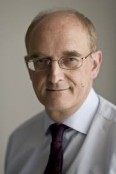Prominent Poles
Leszek Krzysztof Borysiewicz (aka Sir Leszek Borysiewicz), FRS a Polish-British physician, immunologist and scientific administrator. He is currently the 345th Vice-Chancellor of the University of Cambridge. Borysiewicz was formerly chief executive of the United Kingdom's Medical Research Council.

Born: April 13, 1951, Cardiff, Wales (United Kingdom)
Early days. His parents, Jan Borysiewicz and Zofia Helena Borysiewicz née Woloszyn, were Polish World War II-era refugees that came to the UK in 1947 with the Anders' Army after spending two years in the Soviet Siberia. Borysiewicz studied medicine at Welsh National School of Medicine and received a Ph.D from the Royal Postgraduate Medical School. Professor Borysiewicz grew up on an estate in Cardiff in a small, Polish-speaking community. He did not speak English until he was five years old (he also speaks some Welsh). An able student, he passed his 11-plus examination to gain a place at Cardiff High School, where he enjoyed biology and chemistry as well as extra-curricular activities including chess, rugby, cricket and music. He next gained a place at the Welsh National School of Medicine (now part of the Cardiff University School of Medicine) where he developed an interest in experimentation and the crossover between different academic disciplines. In 1977, he moved to London as a postdoctoral researcher, taking up an MRC Clinical Training Fellowship at the Royal Postgraduate Medical School. There, he witnessed a number of attempted kidney transplants in which the kidney survived but patients suffered the effects of cytomegalovirus as a result. This stimulated a lifelong research interest in immunology and how and why latent viruses that normally remain quiescent in humans can suddenly morph into pathogens. Broadly, his research specialisms also include infectious diseases, cell mediated immunity and vaccine development.
Career. He continued at the Royal Postgraduate Medical School, latterly as a senior lecturer, before taking up a six-month post in the Gambia, where his work in state hospitals further whetted his appetite to study global health issues. In 1987 he pursued a career in academic medicine at the University of Cambridge, where he was a fellow of Wolfson College, and then as a consultant at Hammersmith Hospital. In 1991 he headed the Department of Medicine at the University of Wales before joining Imperial College London, where in 2004 he was promoted to Deputy Rector responsible "for the overall academic and scientific direction of the College," In September 2007, it was reported he would succeed Colin Blakemore as the 9th head of the Medical Research Council, a national organization that supports medical science with an annual budget of around £500 million. During his time with the MRC he was elected as Vice President of the Heads of European Research Councils and Chair of the Heads of International Biomedical Research organizations. Borysiewicz's research focuses on viral immunology, infectious disease, and viral-induced cancer. He has co-authored and co-edited a number of books on these subjects, including Vaccinations. In the 2001 New Year Honors he was made a knight bachelor for services to vaccine research. In 2002 he was awarded the Moxon Trust Medal of the Royal College of Physicians. He is also a Governor of the Wellcome Trust, a council member of Cancer Research UK, a founding fellow of the Academy of Medical Sciences and co-chair of the MRC's advisory group on stem cell research.
Personal. Professor Borysiewicz met his wife, Gwenllian, at medical school and they have been married since 1976. They have two adult daughters, one of whom is also a medical doctor and the other a statistician. In his spare time, he is a keen student of military history who enjoys visiting ancient battlefields and is also an accomplished painter. He enjoys rugby and cricket.
Awards, distinctions. He is a member of more than 70 professional and distinguished organisations. Among his many honors he holds the Royal Society of Medicine's Jephcott Medal and the Royal College of Physicians' Moxon Trust Medal and is a Fellow of the Royal Society. He is also the author of reports for the World Health Organization, the MRC and the Department of Health and was chair of the research advisory group that reviewed and co-ordinated the human health research strategy on Creutzfeld-Jakob Disease. He was awarded an honorary doctorate of medicine in 2010 at The University of Sheffield. He is also a Founding Fellow of the Learned Society of Wales.
This article uses, among others, material from the Wikipedia article "Leszek Borysiewicz":
Wikipedia
Text is available under the Creative Commons Attribution-ShareAlike License; additional terms may apply.
supplemented by information found in other sources
University of Cambridge Extended biography
Return to home page:
Prominent Poles
